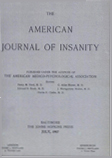PROGNOSTIC CRITERIA IN HEBEPHRENIA
Abstract
From our data the following conclusions can be drawn:
1. Males developed the disorder at a younger age than females. The number of men who became schizophrenic declined more rapidly than that of the females. The earlier the age of onset the less favorable the prognosis. The cases beginning at an early age, also gave evidence of a progressive course more frequently than those commencing later in life.
2. The data concerning the constitution of the patients reveal that individuals of asthenic habitus tend to run a progressive course and as a rule do not get well. Patients of athletic habitus show a greater possibility of recovery in the ratio of one recovery to every three cases. Patients of pyknic and dysplastic habitus as a rule develop an atypical form of hebephrenic schizophrenia and show a tendency to improvement or recovery.
Access content
To read the fulltext, please use one of the options below to sign in or purchase access.- Personal login
- Institutional Login
- Sign in via OpenAthens
- Register for access
-
Please login/register if you wish to pair your device and check access availability.
Not a subscriber?
PsychiatryOnline subscription options offer access to the DSM-5 library, books, journals, CME, and patient resources. This all-in-one virtual library provides psychiatrists and mental health professionals with key resources for diagnosis, treatment, research, and professional development.
Need more help? PsychiatryOnline Customer Service may be reached by emailing [email protected] or by calling 800-368-5777 (in the U.S.) or 703-907-7322 (outside the U.S.).



